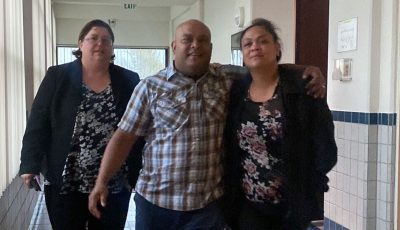Employers urged to file CW for FY19
USCIS: Rejected petitions must be reapplied
U.S. Citizenship and Immigration Services is urging employers to initiate applications on their employees’ CW-1 permits as U.S. President Donald J. Trump last Wednesday enacted legislation that extends the program beyond 2019 and increases the cap limitation for the fiscal year.
Trump’s passage of U.S. Rep. Rob Bishop’s (R-UT) H.R. 5956, which is co-sponsored by Delegate Gregorio Kilili C. Sablan (Ind-MP), effectively raises the CNMI-Only Transitional Worker Program permit cap for fiscal year 2019 to 13,000. USCIS in a previous communication set the cap for fiscal year 2019 to a mere 4,999 in respect to the program’s previous expiry date of Dec. 31, 2019. H.R. 5956 is also known as the NMI U.S. Workforce Act of 2018.
With the passage of H.R. 5956, USCIS in a communication to Saipan Tribune said they are urging employers to start applying for their CW-1 permit needs.
“USCIS encourages employers to file a petition for a CW-1 nonimmigrant worker as early as possible within the six months prior to the proposed start date,” said a USCIS representative. USCIS further noted that they would still reject petitions that are filed more than six months in advance.
The USCIS representative stated that previous permit applications that were rejected must be applied once more for USCIS to reconsider the application.
“USCIS will now resume accepting CW petitions for FY 2019. Employers whose petitions were previously rejected because the cap was reached must file a new petition if they want CW workers under the increased cap. USCIS did not retain and cannot reopen previously rejected petitions,” the USCIS representative stated.
She added that with the passage of H.R. 5956, an imposed mandatory $50 fraud prevention and detection fee per petition is effective along with other current fees, such as the additional $200 annual supplemental fee worker and the mandated fees for educational programs in the CNMI.
According to a statement from Sablan’s office, the other new provisions would be in effect come fiscal year 2020.
“USCIS will reject any received petition that includes an incorrect or insufficient fee payment,” the USCIS representative stated.
Sablan stated USCIS stopped taking applications on April 11, 2018, when the 4,999 cap USCIS set for fiscal year 2019 was met.
Given the urgency of the CW-1 program, the Department of Homeland Security has exercised its discretion, as provided in H.R. 5956, to delay the implementation of other changes to the CW-1 program until an interim final rule is issued. USCIS is under the umbrella of DHS.
In a separate statement, Gov. Ralph DLG Torres’ administration continues to discuss with the federal government the implementation of the new changes as provided by H.R. 5956.
Press secretary Kevin Bautista said the governor has on “several occasions” prior to the passage of the CW bill, met with the White House and DHS to discuss its implementation.
Bautista noted that a key provision of H.R. 5956 allowed Torres to submit recommendations on the development of the interim final rules regarding the implementation of H.R. 5956 within 60 days following its enactment.
“The administration has already been working on submitting these recommendations within the next week with a focus on seeking implementation prior to September 30, 2018,” Bautista told Saipan Tribune, adding that the Torres administration has been raising concerns regarding the dire need of hospital nurses at the Commonwealth Health Center. Saipan Tribune previously learned that only one nurse was approved from the previous lottery USCIS held for the CW-1 permits earlier this year when the cap was only at 4,999.
“We will continue to work with our federal partners to ensure the intents of H.R. 5956 are upheld and that the economy can continue to grow and services can be provided without interruption,” Bautista told Saipan Tribune.
House Speaker Rafael S. Demapan (R-Saipan), in a statement to Saipan Tribune, said the passage of the CW bill was a “victory” for the NMI.
Even with the passage and the close call, Demapan believes it is still proper to “remain vigilant.”
“…We must…continue to work hard with all stakeholders especially the business community and educational system to come up with a more permanent and sustainable workforce pipeline system, improve our local and U.S. worker employment system, and also improve our CW system as well, including looking into and preparing for other issues and impacts that may be forthcoming,” he said in his statement.
Torres in a previous statement reflected the same belief.



























